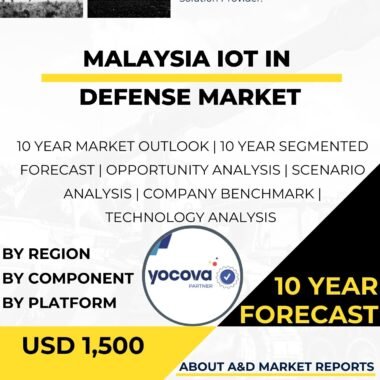Description
The China IoT in Defense Market is a rapidly evolving sector within the country’s defense industry, encompassing the deployment of Internet of Things (IoT) technologies and applications for military purposes. IoT in defense refers to the integration of sensors, devices, networks, and data analytics to enhance situational awareness, optimize resource allocation, and improve operational efficiency in defense operations. China’s focus on military modernization and the adoption of advanced technologies has driven the growth and development of the Defense IoT Market.
China has significantly increased its investment in research and development to develop indigenous IoT technologies for defense applications. The country recognizes the strategic advantages of IoT in defense operations, including real-time data collection, remote monitoring, predictive analytics, and networked communication. China’s pursuit of IoT capabilities aligns with its goal of improving defense capabilities, optimizing resource allocation, and enhancing mission effectiveness. Chinese defense companies, in collaboration with research institutes and technology providers, have been actively involved in the development and deployment of IoT technologies to meet the specific requirements of military applications.
One of the key drivers of the China IoT in Defense Market is the government’s push for technological self-sufficiency. China aims to reduce its dependence on foreign suppliers and enhance its domestic defense industrial base. To achieve this goal, significant investments have been made in research and development, leading to notable progress in the design and implementation of indigenous IoT solutions. Chinese defense companies are committed to advancing IoT technologies to ensure that China possesses cutting-edge capabilities for national defense.
Furthermore, IoT in defense offers several advantages, such as improved situational awareness, enhanced communication and coordination, and efficient resource management. IoT systems can enable real-time monitoring of military assets, personnel, and infrastructure, facilitating timely decision-making and response. By collecting and analyzing data from diverse sources, IoT technologies provide valuable insights for optimizing resource allocation and improving operational efficiency. Chinese defense companies have been actively engaged in developing and deploying IoT solutions to meet the demanding requirements of military applications, ensuring improved operational capabilities and mission effectiveness.
Moreover, China benefits from a robust and well-established technology industry, which facilitates the development and deployment of IoT solutions for defense applications. The country possesses several state-owned and private companies with expertise in telecommunications, network infrastructure, data analytics, and cybersecurity. These companies have the infrastructure, resources, and technical know-how to design, develop, and implement state-of-the-art IoT solutions. The presence of a strong technology industry promotes collaboration and knowledge sharing, further boosting the growth of the Defense IoT Market.
Additionally, the China Defense IoT Market has witnessed increasing international collaborations and partnerships. Chinese defense companies have actively sought partnerships with foreign technology providers to access advanced IoT technologies, expertise, and global markets. These collaborations enable technology transfer, knowledge exchange, and the adoption of international standards and best practices, enhancing China’s indigenous capabilities in IoT deployment for defense applications. Furthermore, the export of Chinese IoT solutions to other countries contributes to the growth of the market, establishing China as a competitive player in the global defense IoT industry.
However, the China Defense IoT Market also faces challenges. Cybersecurity is a significant consideration as IoT systems become increasingly interconnected and reliant on data exchange. Ensuring the security and integrity of data, protecting against cyber threats, and maintaining secure communications are crucial for the successful deployment of IoT solutions in defense operations. Chinese defense companies must prioritize cybersecurity and adhere to international standards to build trust with domestic and international customers.
Moreover, interoperability and compatibility with existing defense systems and legacy infrastructure pose challenges in the integration of IoT solutions. Chinese defense companies must address these challenges to ensure seamless integration and optimal performance of IoT systems across different defense applications.
In conclusion, the China Defense IoT Market is witnessing rapid growth and development. The government’s focus on technological self-sufficiency, combined with investments in research and development, has led to significant advancements in indigenous IoT technologies for defense applications. China’s growing military capabilities, robust technology industry, and international collaborations contribute to its position as a competitive player in the global defense IoT industry. Addressing cybersecurity, interoperability, and promoting international collaborations will be crucial for further growth and success in this dynamic sector.




